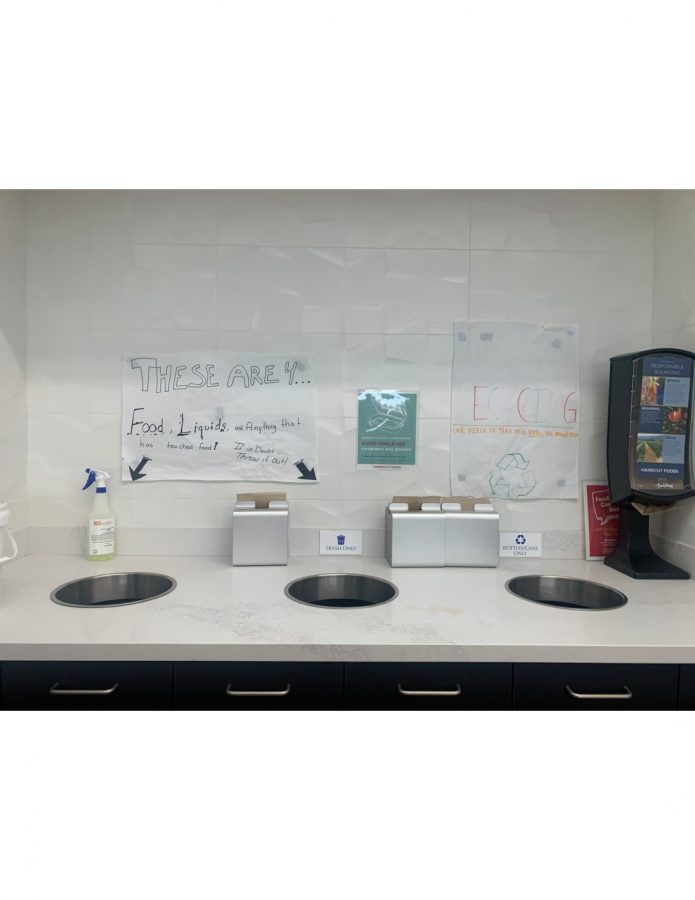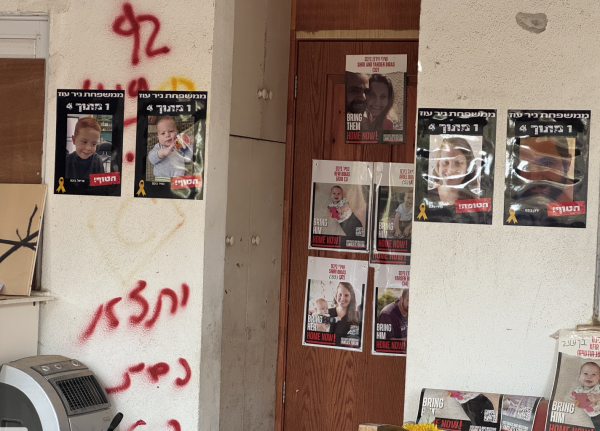Can It: Time to Cycle Through a New Recycling System
Student-made signs above the garbage bins in the learning commons indicate that only bottles and cans can be recycled
Latin is a progressive school that is always evolving. In the past four years, much has changed as a result of student-led movements.
For example, students have started a movement toward a “green” and more environmentally friendly school. As daily front-page headlines announce, the world is facing tremendous environmental issues. In some ways, Latin has recognized this issue as an important one and has strived to make changes in the community. For example, the school recently added water fountains equipped with a water bottle filling station in hopes of promoting reusable water bottles. Additionally, a few members of the Latin community launched the Green Club: a group dedicated to promoting eco-friendly ideas. The Green Club has raised awareness through gatherings and social media but is perhaps most famous for commencing the North Avenue beach sweep, an annual event where Romans help pick up trash from a beach.
There is a different story to be told inside the cafeteria. While Latin provides reusable plates, trays, utensils, and cups to students, they also provide disposable versions of all items. This may seem okay, especially after they switched from styrofoam to compostable to-go boxes; however, it is important to note that the recycling system is impractical, and Hand Cut Foods no longer composts due to COVID concerns.
A large sign above the sole recycling bin in the cafeteria reads, “cans and bottles only.” That’s right—out of all things that can be recycled, Latin allows only cans and bottles to be accounted for. You cannot find these items on any given day in the lunch line. What is the use of even having a recycling bin if it is barely going to benefit the environment?
Another problem is that so many recyclables are wasted. The disposable items that are provided are used generously among the students, faculty, and staff. In particular, the to-go boxes are very popular. What makes to-go boxes so great? Well, nothing really, except that they are easy to dispose of. In contrast to scraping reusable plates from excess food and then laying them in the canister to be washed, it takes much less time to simply throw away the recyclables. And time management is fundamental to eating in the cafeteria.
Students and faculty usually have only 35 minutes to eat lunch before their next class starts. Given that there are only two different lunch periods and almost 600 students and faculty members to feed, it is pretty likely that you are going to be stuck in the lunch line for a great deal of time. As a result, grabbing a to-go box may be a lifesaver when trying to make it to class on time.
The system needs to change for Latin to continue to develop into a green school. You may be asking yourself, so what? Well, recycling has so many benefits to the world that cannot simply be ignored. First and foremost, recycling reduces waste sent to landfills. Moreover, some recyclables, such as plastic, take hundreds of years to decompose. Additionally, recycling reduces energy consumption, as people become less dependent on newly made recyclables. Specifically, making most of these materials requires mining and processing, which takes a lot of time, effort, and above all, energy. Altogether, recycling makes the world a better place. It is important to protect our world, given that the existence of mankind depends on the earth’s well-being.
The obvious solution would be for the school to recycle all recyclable materials. Another potential solution is the school banning the use of the plastic and paper tablewares. This option would force students, faculty, and staff to use the reusable equipment while eating. Regardless, something needs to be done.
Let’s make a difference. It is time to start recycling—the proper way.



















































